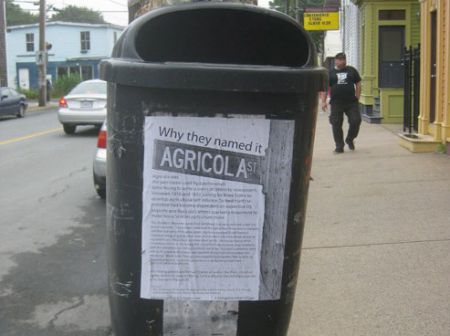From June until September the Roberts Street Social Centre hosts an artist, writer, and zine-maker residency program. Tim Groves , founder of the Missing Plaque Project and an investigative researcher in Toronto, was chosen as one of the Artists in Residence for the month of August. During his 2-week stay, Tim created posters on ignored and overshadowed Halifax history. Hillary Lindsay spoke with Tim about his Halifax project.
Hillary: Why did you decide to start making these historical posters?
Tim: In 2002, I began working on a project to make a zine about Toronto, a guidebook. It never got finished, but when I began researching the history section I decided to look into a riot that happened in a park a few block from my house, the Christie Pits Riot. I had vaguely known that a riot had once taken place but when I started researching what really happened I was blown away. I had no idea that such a vicious riot had taken place. The idea of swastika clubs in Toronto, or street fighting with weapons including metal pipes, baseball bats, and pickaxes really surprised me. I knew if I had grown up a few minutes walk from this park and not know about this history many other people would also not know about it. If I had made a zine it would only reach a handful of people, but if I made a poster anyone in the area might stumble upon it. I didn't want to just reach my friends and the sorts of people who read zines. I wanted to tell people who lived and worked and spent time in the area about the history and by making posters and wheat pasting them up in the area the history is about I was able to target my writing towards them. Soon after making a poster on the Christie Pits Riot I discovered that Old Chinatown was demolished to make way for Toronto's City Hall, and I decided to make a poster about that as well. The more I looked at Toronto's history the more I found that important events in the cities past had been covered up, or omitted from most accounts of the city's history. As I started learning more about Toronto's history I was driven to try and tell a different version Toronto's history. In the last seven years I have made 15 posters on Toronto's history.
Could you give some examples of the posters you're making for Halifax?
I have made four posters. One is on how Agricola [street] got its name. The second is about how the original name of this place [Halifax] was, and is Jibuktuk. The third is on Cornwallis and the genocide he planned of the Mi'kmaq people. The fourth is on the protests against the CBC homophobia in the 1970's.
Why don't Haligonians know this history?
Some people know the histories that I tell in the poster about Halifax, but many others do not. There are lots of interesting histories that connect to our lives today, but the histories that get the most promoted often teach us the lesson that history is banal and boring. Official plaques are often lack context, but they also tend to tell the history in a way that makes the city look good to tourists, and improve real estate values. The histories that show the complicated sides of the history often don't get told, especially when they show the racism that cities across Canada were built upon. There are some really great history books out there, but many history books also focus on the more banal aspect of history. For histories to become well known people need to promote them. There are a lot of histories that it is clearly not in the interests of government and other powerful intuitions in our society to promote. Halifax in particular has a history that is steeped in genocide (Cornwallis), racism (Africville, etc), and War, (military, explosions, and near explosions). It is not surprising that a lot of these stories have been obscured from public sight.
What are some of the challenges of making posters like these?
With only two and half weeks in Halifax I was not able to research, write and design posters for all the topics for posters that were suggested to me. Some of the topics that seemed most interesting to me did not get posters made about them. I have made a list of all the other topics for posters that I wish I could have made. I hope that some people take up the challenge and make their own poster, but I am not too optimistic that it will happen. I am trying to find a way to put the posters I have made out on a creative commons licence so others build off the work I have done,
What are you hoping the outcome of the postering will be?
I want to get people to talk and think more about history, Halifax's history and history in general. I hope that the histories I have highlighted become more public knowledge. History is important and too many of the most important stories have become obscured. I also think histories I have highlighted are relevant today. I think we need to see how things like racism, homophobia and sexism have changed to know how to fight it today. My posters can only go so far in doing that, but hopefully I inspire some people to look more closely at the history of the places where they live.



